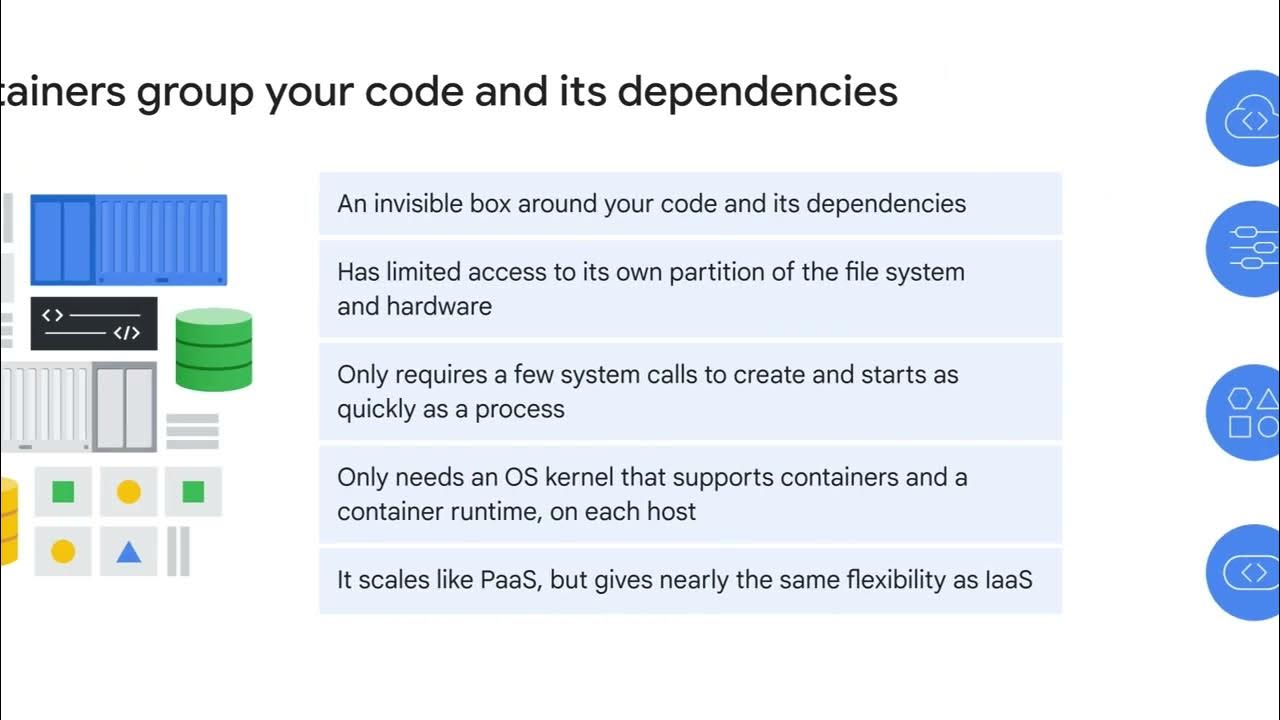6-6
Summary
TLDRThis video provides an insightful overview of AWS container services, explaining what containers are, how they differ from virtual machines, and their advantages in terms of efficiency and scalability. It covers key services such as Amazon ECS (Elastic Container Service), which simplifies container orchestration, and Amazon EKS (Elastic Kubernetes Service), which manages Kubernetes clusters for scaling and automation. The video also introduces Amazon ECR (Elastic Container Registry) for storing and managing Docker images. AWS offers flexible and powerful tools for managing containers, allowing developers to focus on applications rather than infrastructure.
Takeaways
- 😀 Containers are a method of operating system virtualization, sharing a virtualized OS and running as isolated processes.
- 😀 Containers are smaller and faster than virtual machines, offering quicker launch times and more efficient resource use.
- 😀 Docker is a software platform that packages applications into containers, simplifying container management with simple commands.
- 😀 Containers are different from virtual machines in that they don't require an entire operating system, only the necessary application code and libraries.
- 😀 Amazon ECS (Elastic Container Service) simplifies container management by orchestrating Docker containers and managing EC2 instances.
- 😀 Amazon ECS allows you to create task definitions, which specify which containers to deploy, how many tasks to run, and where to place them in your cluster.
- 😀 Amazon ECS supports EC2 launch types and can be managed using EC2 instances or without managing the infrastructure via AWS Fargate.
- 😀 Kubernetes is an open-source container orchestration tool that automates container provisioning, load balancing, and scaling, and can be used with Docker.
- 😀 Amazon EKS (Elastic Kubernetes Service) simplifies Kubernetes management on AWS, providing a certified Kubernetes control plane and integrating with AWS tools.
- 😀 Amazon ECR (Elastic Container Registry) is a fully managed Docker container registry for storing and managing container images, integrated with Amazon ECS and EKS.
Q & A
What are containers in the context of AWS services?
-Containers are a method of operating system virtualization where applications are packaged with their dependencies into self-contained environments. Unlike virtual machines, containers do not include an entire operating system but share a virtualized operating system, enabling faster deployment and resource efficiency.
How do containers differ from virtual machines?
-Containers are smaller and more efficient than virtual machines. Virtual machines run directly on a hypervisor and include a full operating system, whereas containers share the host OS and run as isolated processes, leading to faster launch times and less resource usage.
What role does Docker play in containerization?
-Docker is a platform that packages applications into containers. It provides tools to build, start, and manage containers on servers, with each container including everything needed to run the application, such as libraries, system tools, and the application code.
What is Amazon ECS (Elastic Container Service)?
-Amazon ECS is a scalable, high-performance container management service that orchestrates the running of Docker containers on a fleet of EC2 instances. It simplifies container management by removing the need to manage infrastructure manually, offering services like elastic load balancing, security groups, and EBS volumes.
How does the task definition work in Amazon ECS?
-A task definition in Amazon ECS acts as a blueprint for applications. It specifies which containers should run, the number of tasks to deploy, and other resource requirements. The ECS task scheduler places the tasks in a cluster based on available CPU and memory.
What is the difference between EC2 launch type and Fargate launch type in ECS?
-The EC2 launch type allows you to manage the EC2 instances that run your containers, offering more granular control over your cluster. The Fargate launch type, on the other hand, abstracts the underlying infrastructure, letting AWS manage the cluster and allowing you to focus solely on the application containers.
What is Kubernetes, and how does it relate to container orchestration?
-Kubernetes is an open-source system for automating the deployment, scaling, and management of containerized applications. It allows developers to run and manage containers at scale across on-premise and cloud environments, including integrating with Docker.
What is Amazon EKS, and how does it simplify container management?
-Amazon EKS (Elastic Kubernetes Service) is a managed service that simplifies the running of Kubernetes clusters on AWS. It eliminates the need to install, operate, and maintain a Kubernetes control plane, making it easier to run containerized applications at scale.
Why does AWS offer both Amazon ECS and Amazon EKS?
-AWS provides both ECS and EKS to give customers flexibility. ECS is ideal for users who prefer a fully managed container orchestration service optimized for AWS, while EKS is suited for users who want to use Kubernetes for container orchestration with minimal operational overhead.
What is Amazon ECR and how does it integrate with ECS and EKS?
-Amazon ECR (Elastic Container Registry) is a fully managed Docker container registry that allows developers to store, manage, and deploy container images. It integrates with both Amazon ECS and EKS, enabling the retrieval and management of container images for applications running in these services.
Outlines

This section is available to paid users only. Please upgrade to access this part.
Upgrade NowMindmap

This section is available to paid users only. Please upgrade to access this part.
Upgrade NowKeywords

This section is available to paid users only. Please upgrade to access this part.
Upgrade NowHighlights

This section is available to paid users only. Please upgrade to access this part.
Upgrade NowTranscripts

This section is available to paid users only. Please upgrade to access this part.
Upgrade NowBrowse More Related Video

Containers on AWS Overview: ECS | EKS | Fargate | ECR

How A Container Ship Secures Containers - Design, Safety, Container Locating

The only Cloud services you actually need to know

Mengenal Teknologi Infrastruktur IT | Baremetal vs Virtual Machine vs Container | Pemula WAJIB TAU!

Containerizing and Orchestrating Apps with GKE

Macam Macam Alat Berat Pelabuhan | Harbour Mobile Crane, Reach Stacker, Container Handler
5.0 / 5 (0 votes)